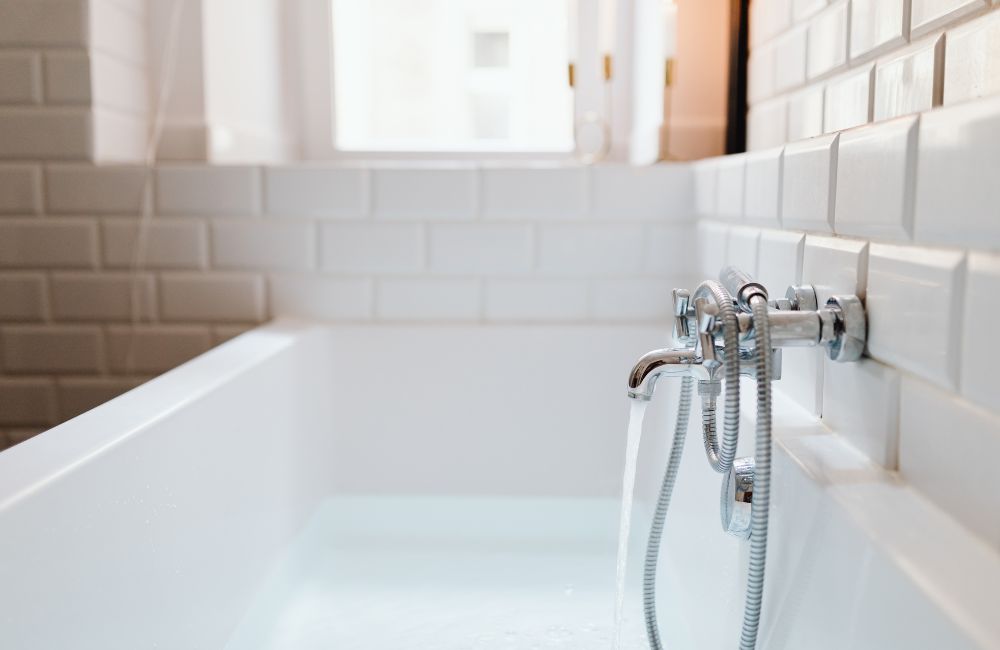Bathroom renovations are among the most rewarding home improvement projects. They not only increase the overall value of a property but also enhance the functionality and aesthetic appeal of a home. In fact, according to the Joint Center for Housing Studies at Harvard University (JCHS), spending on home improvement projects rose from $328 billion in 2019 to $472 billion in 2022, with an expected increase to $485 billion by 2024. However, what many homeowners often overlook is the complex plumbing work that goes into a successful renovation. Whether you’re installing a modern vanity, updating your shower, or relocating a toilet, it’s essential to involve a professional plumber in the process.
Plumbing is the backbone of a bathroom, and any mistake or oversight during a renovation can lead to long-term damage and costly repairs.
Table of Contents
Key Takeaways
Why Hiring a Plumber is Important in Bathroom Renovations
How a Plumber Can Help with Bathroom Renovations
1. Assess the Current Plumbing Layout
2. Remove Old Fixtures: Toilets, Sinks, and Tubs
3. Fix or Upgrade Wastewater Lines
4. Install New Showers and Bathtubs
5. Run New Plumbing Lines for Modern Designs
6. Install Vanity Sinks and Faucets
7. Ensure Proper Ventilation in Plumbing Systems
8. Work with Permits and Local Codes
How to Choose the Right Plumber for Your Bathroom Renovation
Frequently Asked Questions
Contact L&P Plumbing for Your Bathroom Renovation in Torrington, CT!
| Key Takeaways ✔ Hiring a plumber prevents leaks, water damage, and mold from poorly installed pipes. ✔ Plumbers are familiar with local codes, ensuring renovations meet legal requirements. ✔ A plumber ensures sinks, toilets, and bathtubs are installed correctly for long-term performance. ✔ Plumbers fix blockages and upgrade outdated lines to ensure proper drainage. ✔ Plumbers reconfigure water lines for modern layouts, avoiding cross-contamination. ✔ Plumbers maintain proper ventilation to prevent sewer gases and ensure efficient drainage. ✔ A licensed plumber secures necessary permits and ensures work passes inspection. ✔ Look for plumbers with bathroom renovation experience, proper licensing, and good communication. |

Why Hiring a Plumber is Important in Bathroom Renovations
Many people assume that a bathroom renovation primarily involves aesthetic changes like replacing tiles or updating fixtures. However, the real complexity lies beneath the surface. Every sink, toilet, bathtub, and shower is connected to intricate water and waste systems that require precision during installation. A plumber is responsible for ensuring these systems work efficiently, are up to code, and meet the demands of your new design.
Here’s why hiring a plumber is crucial:
- Avoid Costly Mistakes: Poorly installed pipes can lead to leaks, water damage, and mold growth. A professional plumber ensures that all connections are properly sealed and that the flow of water is managed effectively.
- Ensure Compliance with Local Codes: A licensed plumber is familiar with local building codes and regulations, ensuring your renovation meets all legal requirements.
- Properly Install Fixtures: Plumbers have the expertise to install sinks, toilets, bathtubs, and showers correctly, ensuring long-term durability and performance.
How a Plumber Can Help with Bathroom Renovations
Bathroom renovations can vary in scope, but the core tasks performed by a plumber generally fall into several essential categories. Each of these tasks plays a pivotal role in ensuring that the final product is both functional and aesthetically pleasing.
1. Assess the Current Plumbing Layout
The first step in any bathroom renovation is a thorough assessment of the current plumbing layout. The plumber will examine the existing pipes, drains, and fixtures to determine whether they can support your new design. In homes with older plumbing systems, it’s not uncommon for the plumber to recommend upgrading to more durable materials like copper or PEX piping, which offer greater longevity and reliability.
Why is this important?
- Identifying Weaknesses: Old pipes or outdated materials may not be compatible with modern fixtures. A plumber will identify weak points in the current system that need to be replaced or reinforced.
- Planning for New Layouts: If you plan to move the location of your sink, toilet, or shower, a plumber can determine the feasibility of running new pipes to those locations.
- Preventing Future Problems: Assessing the plumbing layout helps to identify potential issues like leaks or blockages before they become major problems during or after the renovation.
2. Remove Old Fixtures: Toilets, Sinks, and Tubs
Once the existing plumbing layout has been assessed, the next step involves removing old bathroom fixtures. A plumber has the expertise to safely disconnect and remove toilets, sinks, and bathtubs without damaging surrounding pipes or flooring. Removing old fixtures might seem straightforward, but it often requires specialized tools and techniques that a plumber is trained to use. Attempting this step without professional help can lead to costly damage.
Why should a plumber handle this?
- Preventing Pipe Damage: Improperly removing fixtures can damage the pipes and connections that are hidden behind walls or under floors.
- Proper Disposal: A professional plumber will also ensure that the removed fixtures are disposed of in accordance with local regulations, especially if they contain materials like lead or asbestos.
- Inspection for Wear and Tear: As the old fixtures are removed, a plumber will check for signs of wear in the connections and pipes, addressing any issues before new fixtures are installed.
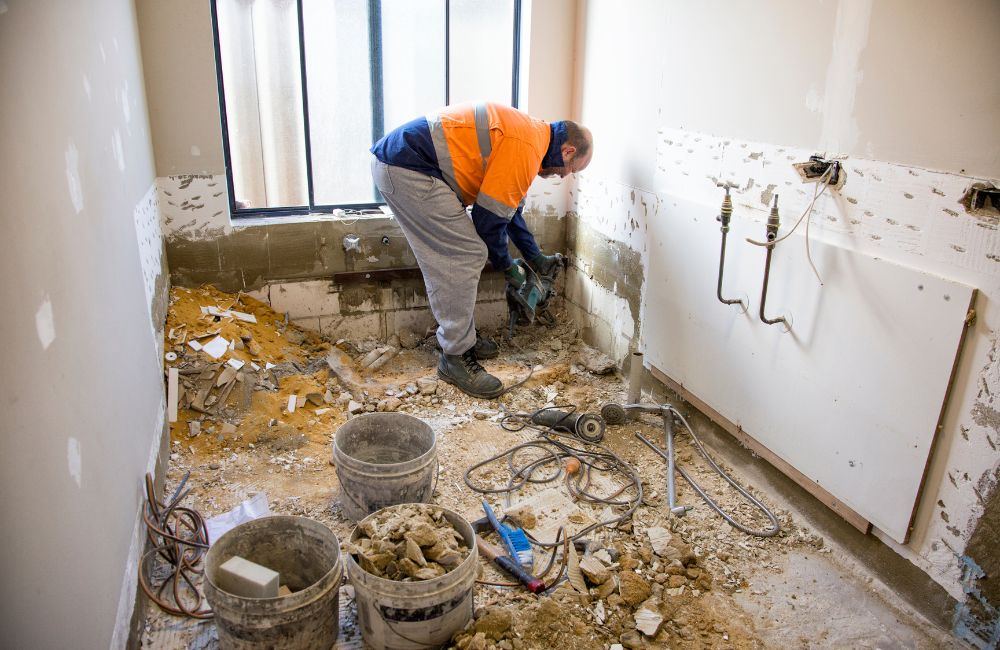
3. Fix or Upgrade Wastewater Lines
The proper functioning of wastewater lines is critical in any bathroom. These lines remove dirty water from sinks, showers, and toilets, directing it away from your home. If these lines are improperly installed or outdated, they can lead to unpleasant odors, slow drainage, or even backups. This step is critical for ensuring that your new bathroom will not only look good but also function properly. A plumber’s attention to wastewater lines helps prevent costly water damage down the road.
What does a plumber do?
- Fix Blockages: Plumbers will inspect the wastewater lines for blockages or buildup, ensuring that water can flow freely. This prevents backups and ensures proper drainage.
- Upgrade Lines: In many older homes, wastewater lines may need to be upgraded or replaced. A plumber will replace outdated lines with modern materials that are more resistant to corrosion and blockages.
- Correct Installation Issues: If the previous lines were improperly sloped or connected, a plumber can fix these issues to prevent future problems.
4. Install New Showers and Bathtubs
Showers and bathtubs are the focal points of many bathroom renovations, and their installation is one of the most challenging aspects of the project. A plumber plays a critical role in ensuring that these fixtures are installed correctly. As smart technology becomes more integrated into home design, it’s important to note that the global smart bathroom market experienced a 10.2% compound annual growth rate (CAGR), rising from $4.6 billion in 2022 to $4.7 billion in 2023. These advanced showers and bathtubs require precise installation to function properly, and plumbing for such fixtures demands expertise.
Key responsibilities of a plumber:
- Connecting to Water Lines: A plumber will connect the new shower or bathtub to the water supply, ensuring that both hot and cold water flow at the correct pressure.
- Ensuring Proper Drainage: The plumber will also install or adjust the drainage system to handle the water output from the shower or tub, preventing water from pooling or backing up.
- Sealing Fixtures: Proper sealing is crucial to prevent water from seeping into the walls or floors, which can cause structural damage over time. A plumber will ensure that all connections are properly sealed.
5. Run New Plumbing Lines for Modern Designs
Modern bathroom designs often require a reconfiguration of the existing plumbing system. Whether you’re installing a new vanity with dual sinks or relocating the shower, running new plumbing lines is a job best left to a professional plumber. Running new plumbing lines is a complex task that requires careful planning and precise execution. A professional plumber ensures that these new lines are properly integrated into the home’s existing system.
What does this involve?
- Rerouting Water Supply Lines: If your renovation involves moving the location of the shower or sink, a plumber will reroute the water supply lines accordingly. This ensures that water reaches the new fixtures without any issues.
- Installing Additional Lines: For dual sinks or multi-showerhead systems, additional plumbing lines may need to be installed. A plumber will ensure that these lines are properly connected and meet local building codes.
- Avoiding Cross-Contamination: One of the most important tasks for a plumber is ensuring that there is no cross-contamination between clean water supply lines and wastewater lines.
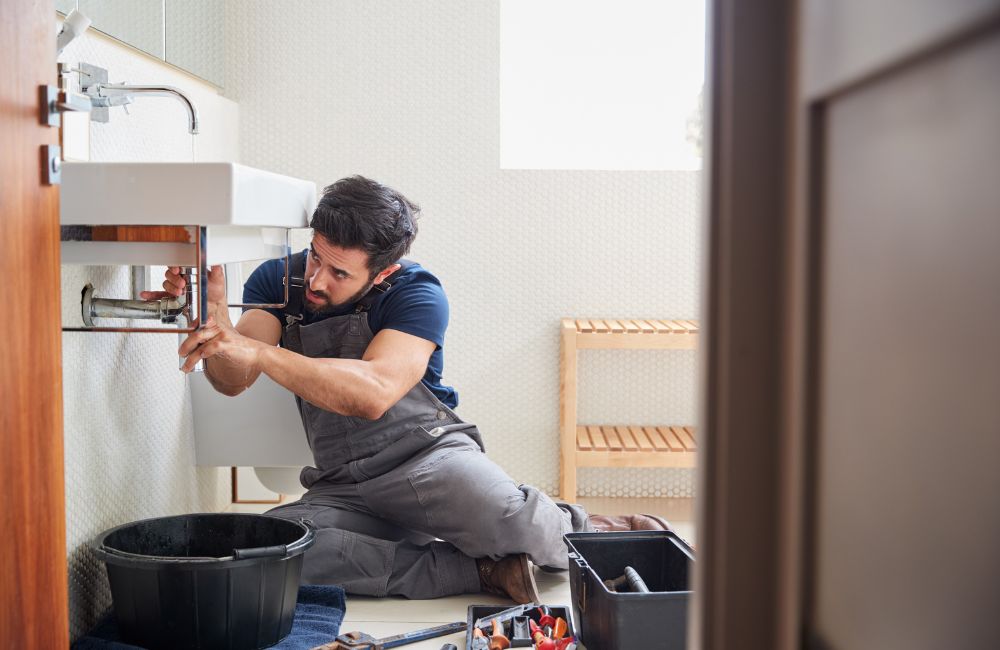
6. Install Vanity Sinks and Faucets
The installation of vanity sinks and faucets is another critical aspect of bathroom renovations. While these fixtures may seem simple to install, there are several plumbing considerations that need to be addressed to ensure proper functionality. Installing a vanity sink is not just about aesthetics. Without the expertise of a plumber, even the most beautiful sink can become a headache if it’s not properly connected to the plumbing system.
How can a plumber help?
- Connect to Water Supply: A plumber will connect the new sink to the hot and cold water supply, ensuring that water flows smoothly at the correct pressure.
- Ensure Proper Drainage: The plumber will install the drain pipes and ensure that water flows out of the sink without any clogs or backups.
- Seal Connections: Plumbers will also ensure that all connections between the sink, faucet, and water lines are properly sealed to prevent leaks.
7. Ensure Proper Ventilation in Plumbing Systems
Ventilation is an often-overlooked aspect of bathroom plumbing. Proper ventilation prevents sewer gases from entering your home and ensures that wastewater drains efficiently. A plumber will assess the current ventilation system and install new vents if necessary. Ensuring proper ventilation is critical for maintaining a safe and functional bathroom. A plumber’s expertise in this area helps avoid unpleasant odors and potential health risks.
Why is ventilation important?
- Prevents Sewer Gases: A properly ventilated plumbing system prevents harmful gases from backing up into your home, protecting the health and safety of your family.
- Ensures Proper Drainage: Without proper ventilation, drains can become slow or gurgle, indicating that air is not being properly vented.
- Compliance with Codes: Many local building codes require specific ventilation systems for bathrooms, and a plumber will ensure that your renovation meets these requirements.
8. Work with Permits and Local Codes
Bathroom renovations must comply with local building codes and regulations. Plumbing work, in particular, is often subject to strict codes that vary depending on the location. A licensed plumber will ensure that all work meets these legal requirements. By working with a licensed plumber, homeowners can avoid the stress and potential legal issues that come with non-compliant plumbing work.
How does a plumber help with permits and codes?
- Obtain Permits: In many cases, a permit is required for extensive plumbing work. A plumber will obtain the necessary permits before beginning the project, ensuring that everything is done legally.
- Meet Building Codes: Plumbers are familiar with local building codes that dictate how pipes, vents, and fixtures should be installed. They ensure that all work meets these codes to avoid fines or future legal issues.
- Pass Inspections: After the plumbing work is completed, a building inspector may need to review the project. A professional plumber ensures that the work will pass inspection, giving you peace of mind.
How to Choose the Right Plumber for Your Bathroom Renovation
Choosing the right plumber for your bathroom renovation is crucial for ensuring a successful project. Here are some tips to help you find the best plumber for the job:
Check for Proper Licensing and Insurance
A licensed plumber has the necessary training and certification to perform plumbing work according to state or local regulations. Always verify that the plumber you hire is licensed and insured. Insurance protects both you and the plumber in case of accidents or damage during the renovation.
Look for Experience in Bathroom Renovations
Not all plumbers specialize in bathroom renovations, so it’s important to find one with experience in this specific area. Ask potential plumbers about their experience with similar projects and request to see examples of their previous work.
Ask for References or Read Reviews
Customer reviews and references are valuable tools for assessing a plumber’s reliability and quality of work. Ask for references from previous clients who have had bathroom renovations and read online reviews to see what others have experienced.
Get Multiple Quotes
Before choosing a plumber, it’s a good idea to get quotes from multiple professionals. This allows you to compare prices and services to find the best fit for your budget and needs. However, avoid choosing the cheapest option just to save money. Instead, focus on the plumber’s qualifications, experience, and reputation.
Ensure Communication and Transparency
A good plumber will communicate clearly and openly throughout the renovation process. They should provide detailed explanations of the work they’ll be doing, timelines, and potential challenges. Transparency about pricing and potential delays is also essential for avoiding surprises during the renovation.
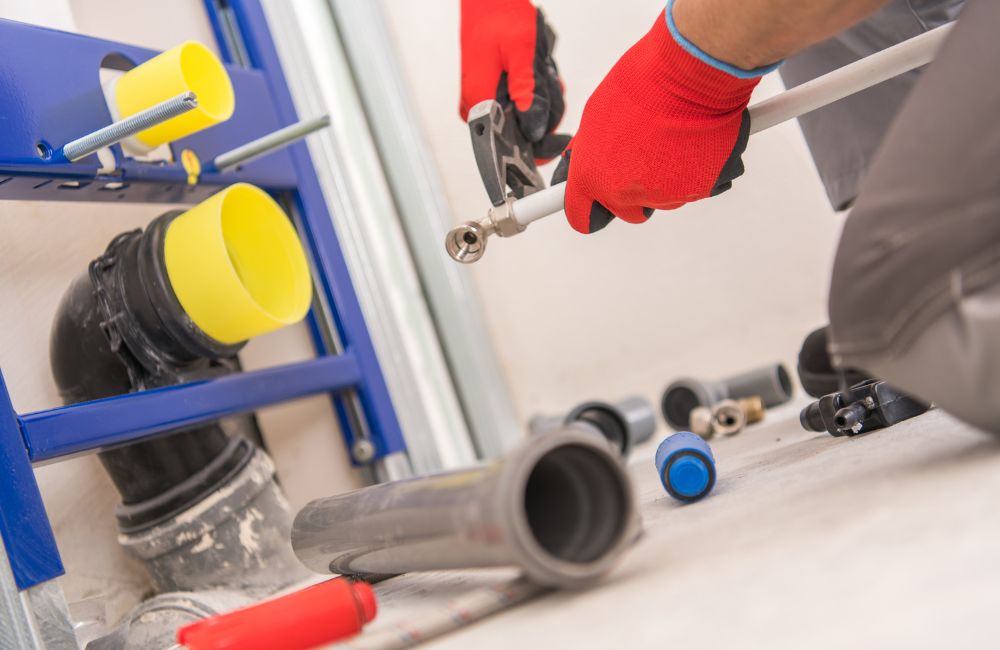
Frequently Asked Questions
What plumbing upgrades should I consider during a bathroom renovation?
During a bathroom renovation, you can consider upgrading to low-flow toilets and faucets, which help conserve water and lower utility bills. Another valuable upgrade is a tankless water heater, which provides on-demand hot water while saving space and energy. Additionally, switching to modern materials like PEX piping can improve durability and reduce the chances of future leaks.
How long does it take for a plumber to complete bathroom plumbing work?
The duration of plumbing work in a bathroom renovation depends on the scope of the project. For simpler renovations, it might take around 2 to 3 days, while more complex remodels that involve reconfiguring plumbing lines can take up to a week. Factors such as unexpected issues, material availability, and inspection times can also impact the overall timeline.
Can a plumber help with water pressure issues during a bathroom renovation?
Yes, a plumber can address water pressure problems by inspecting the water supply system and diagnosing the cause. Solutions may include adjusting pressure valves, clearing any blockages in the pipes, or replacing corroded pipes that restrict water flow. In some cases, a plumber might also recommend installing a pressure booster system to ensure optimal water pressure throughout the bathroom.
What should I do if my plumber finds unexpected issues during the renovation?
If your plumber discovers unexpected problems like damaged pipes, hidden leaks, or outdated materials, it’s important to address these issues immediately. Work closely with your plumber to develop a solution, which may involve repairing or replacing affected components. While these fixes may add to the overall renovation cost, resolving them early prevents more significant issues and costly repairs in the future.
Is it necessary to turn off the water supply before a plumber starts a renovation?
Yes, shutting off the water supply is a critical step before any bathroom renovation to avoid potential flooding or water damage. The plumber will typically turn off the main water supply or isolate the bathroom’s water lines to safely remove old fixtures and install new ones. This ensures that no accidental leaks occur while they work on connecting or disconnecting plumbing components.
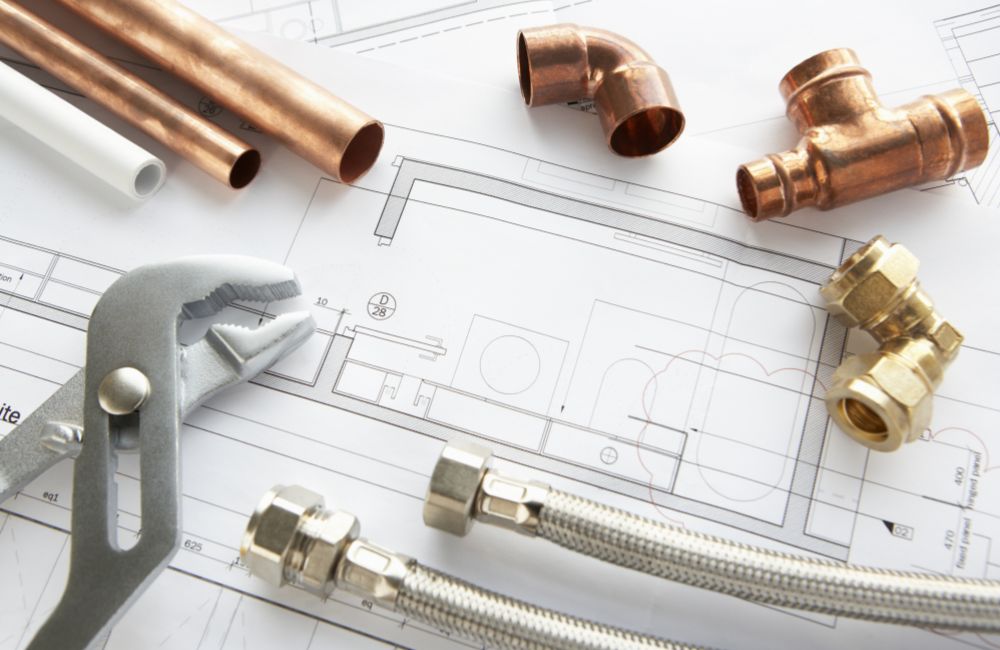
Contact L&P Plumbing for Your Bathroom Renovation in Torrington, CT!
If you’re planning a bathroom renovation, trust L&P Plumbing to handle all your plumbing needs with expertise and precision. Our team of licensed professionals ensures that every aspect of your bathroom’s plumbing—from fixture installation to rerouting pipes—is done right the first time. For residents in Torrington, CT, L&P Plumbing is your local, reliable choice. Don’t risk costly mistakes by doing it yourself—let L&P Plumbing take care of your bathroom renovation.
Contact L&P Plumbing in Torrington, CT, today to schedule your consultation and get your renovation started right!

